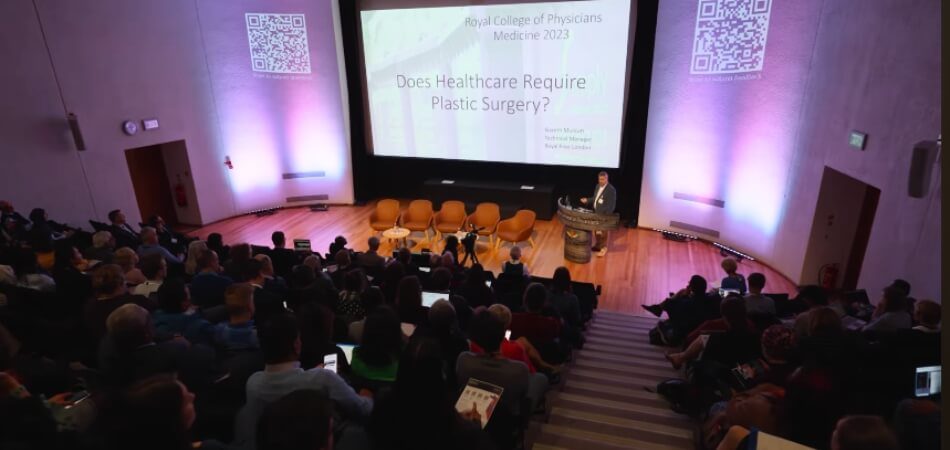The quest to stay abreast of the latest developments in the medical industry often leads to one pivotal question: “How do I find upcoming medical conferences?”
The answer lies in a combination of modern digital tools and traditional networking avenues. Websites such as globalconference.ca and Conference Alerts stand out as specialized hubs, curating the latest in medical events and seminars. Beyond these, turning to trusted professional medical associations can provide a wealth of event listings.
It doesn’t stop there. By immersing oneself in industry publications and making the wise choice to subscribe to relevant newsletters or join esteemed professional networks, one can ensure they’re always in the know. Read on to unlock more secrets on staying updated in this ever-evolving field.
What is the Purpose of a Medical Conference?
Medical conferences are integral to the healthcare community, acting as a nexus for learning, networking, and progression in the field. These events serve multifaceted purposes, each significant to the professionals attending.

- Gathering experts globally, they offer a platform to share breakthroughs and advancements. This accelerates global understanding and adoption of new techniques.
- Attendees can engage in hands-on workshops, enhancing practical skills in these medical and healthcare management conferences. This experiential learning aids immediate application in the real world.
- They provide an opportunity for networking and fostering collaborations. Such connections often lead to groundbreaking research and innovation.
- Professionals can earn continued medical education credits. These are often mandatory for maintaining professional licenses and certifications.
- By showcasing new medical technology and products, they inform attendees. This helps doctors and researchers stay abreast of modern tools.
Conferences, in essence, bridge the gap between knowledge and application, ensuring the medical community remains at the forefront of patient care and research.
Different Types of Medical Conferences
Medical conferences have evolved to cater to diverse needs within the healthcare ecosystem, presenting a rich tapestry of specialized events. Each type of conference offers unique insights and learning experiences, tailoring its content to specific audiences.
Clinical Conferences
Focusing on patient cases, these events dissect clinical scenarios. Participants discuss diagnosis, treatment, and outcomes. The objective is to enhance clinical decision-making.
Research Conferences
These forums showcase the latest medical research findings. Scientists present studies, results, and implications. It’s a nexus for innovation and discovery.
Workshop Conferences
Prioritizing hands-on learning, these sessions emphasize skill development. Participants practice techniques under expert guidance. They’re ideal for mastering new procedures.
Educational Conferences
Dedicated to theoretical knowledge enhancement, they cover medical curricula. Attendees learn about recent updates in medical sciences. They’re crucial for continuous learning.
Product Launches and Exhibitions
Companies showcase medical products and technology here. Attendees can see demonstrations, understand benefits, and interact with creators. It bridges technology with healthcare professionals.
Diversity in conference types ensures that every facet of the medical profession has a platform to grow, innovate, and excel, fortifying the healthcare sector’s future.
How Do I Find Upcoming Medical Conferences?
Staying updated with the latest in the medical realm is vital for professionals, and finding the right medical conferences is a significant part of this quest. Various platforms and methods can guide you to these essential gatherings.
Dedicated Websites
There are different websites where you can find such information, notably comprehensive, which are treasure troves of information. Specifically, globalconference.ca offers a curated list of upcoming events spanning multiple medical specialties. Users can quickly browse, filter, and select events that resonate with their professional interests.
Professional Medical Associations
These organizations often have event calendars or announcement sections on their websites. By being a member, you can also receive direct notifications about upcoming conferences and workshops.
Industry Publications
Many medical journals and publications include advertisements or announcements for upcoming events. Subscribing to or regularly checking these can provide timely information.
Networks and Newsletters:
Joining professional networks and subscribing to industry-specific newsletters can be invaluable. These platforms often send out alerts and reminders for major conferences, ensuring you never miss out.
Personal Recommendations:
Never underestimate the power of word-of-mouth. Colleagues, mentors, or peers can often suggest conferences they’ve found valuable or are looking forward to.
By leveraging these resources, medical professionals can ensure they are always in the loop, ready to participate in events that foster learning, networking, and growth in their field.
Considerations While Looking for Medical Conferences
When scouting for medical conferences, it’s essential to make informed choices to optimize the experience and benefits gained. Several considerations can guide this selection, ensuring a seamless match to one’s professional needs.
- Relevance to Specialty: Choose conferences aligned with your medical specialty. It ensures that the content is directly applicable to your practice.
- Speaker Credentials: Examine the backgrounds of keynote speakers and presenters. Their expertise and reputation can signify the event’s quality.
- Location and Duration: Consider the conference’s location and the time required. This helps in planning logistics, travel, and accommodation.
- Networking Opportunities: Look for events that offer ample networking breaks. Building professional relationships can lead to collaborations and growth.
- Cost and Budget: Evaluate the conference fees against your budget. Factor in additional expenses like travel, lodging, and meals.
- Accreditation: Ensure the conference offers accredited Continued Medical Education (CME) points if required for your license renewal or professional development.
- Feedback from Past Attendees: Seek opinions from colleagues who’ve attended before. Their insights can offer a firsthand perspective on the event’s value.
- Technological Involvement: With the rise of virtual events, check if there’s an online participation option. This can be convenient and cost-effective.
Making thoughtful considerations when choosing a medical conference can amplify the learning experience, ensuring you garner knowledge, skills, and connections pivotal to your professional journey.
Finding Out Upcoming Medical Conferences- How Does it Benefit You?
Staying updated in the dynamic realm of healthcare is paramount. One pivotal way professionals achieve this is by attending medical conferences. But what are the distinct advantages of pinpointing and participating in these events?
Knowledge Enhancement
Medical conferences are a hub for the latest research and findings. Attendees absorb cutting-edge information, ensuring they stay ahead in their field. This knowledge directly influences patient care and outcomes.
Networking Opportunities
Building professional relationships can open myriad doors. Conferences gather experts from various specialties, paving the way for collaborations, research partnerships, and job opportunities. These connections often lead to long-term benefits.
Skill Development
Many conferences offer hands-on workshops. Practitioners can hone specific skills under expert guidance. It’s experiential learning at its finest.
Access to Innovations
Medical technology and tools are continually evolving. By attending conferences, one gains firsthand exposure to these innovations. This can revolutionize one’s practice and treatment methodologies.
Professional Growth
Participation can lead to recognition within the community. Presenting papers, engaging in discussions, or chairing sessions elevates one’s professional stature. Such engagements can enhance career prospects.
Continued Education Credits
Many professionals need Continued Medical Education (CME) credits. Conferences often provide these, aiding in license renewals and meeting professional association requirements. It’s learning with added certification benefits.
Being proactive in seeking out and attending medical conferences is more than just a commitment to one’s profession. It’s a strategic move that equips healthcare professionals with the tools, knowledge, and connections they need to excel in an ever-evolving landscape.
Final Considerations
The decisive questions frequently guide the journey through the medical domain: “How do I find upcoming medical conferences?” These gatherings, as depicted earlier, are essential lighthouses illuminating paths for professionals. They offer a synthesis of learning, networking, and advancement.
Tapping into resources like globalconference.ca or leaning on professional associations can unveil a realm of opportunities. But beyond the search, it’s the immeasurable value these events bring in knowledge, collaboration, and innovation that truly underscores their importance.
In a fast-evolving medical landscape, it’s more than just about attendance; it’s about embracing the comprehensive growth these conferences promise for individuals and the wider healthcare community.







